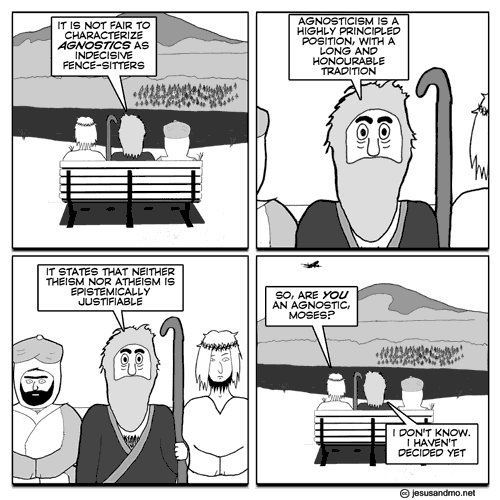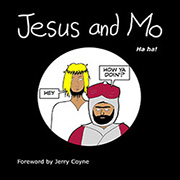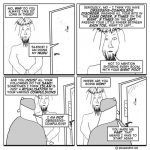fence
August 24th, 2011
I’m away next week, so expect a resurrection on Wednesday.
If you want to buy a book (and why wouldn’t you?), Lulu are having a sale until 27 Aug. Just use this code at checkout for a 20% discount:
SCHOOLED305
(USD purchases only)






Ah, the “other Mo.” We don’t hear from him all that often, and here we see why. Yhe idea that non-theism is not epistemically justifiable is, of course, total nonsense.
“. . . neither IS . . . “
Well spotted, Andrea. Fixed.
Eh? Since “theism” and “atheism” are both singular, “neither…is” is correct.
(Unless you’re saying that it DID say “neither…are” and NOW says “neither…is”, in which case the issue is that the change failed – I currently see the strip as saying “neither…are”.)
@Eli – this website is heavily cached, and uses two separate CDNs. So changes to the image can take a while to propagate. It will say “neither is” eventually.
I DO see agnostics as indecisive fence-sitters, BUT it’s still miles better than believing in supernatural nuttery. Agnosticism is where a person usually is when they are halfway between theism and atheism. They’ve abandoned the theistic belief system but not quite sure if they are ready to continue on to atheism. The most intellectually honest position to be in is agnostic atheism… taking a position of non-belief pending credible evidence otherwise.
But agnosticism doesn’t mean that neither atheism nor theism is epistemically justifiable. This is a common misconception. I think you, like many other people, are getting misled by a subset of agnostics who haven’t made up their minds yet. But many agnostics *have* made up their minds. I, for example, am an agnostic atheist. The point is that agnosticism is about knowledge, while (a)theism is about belief: I don’t believe in God, but I acknowledge that, in principle, it’s impossible to know for certain. It’s worth noting that most atheists are agnostics in this sense. It’s theists, on the whole, who tend to claim certain knowledge in such matters.
I think the teapot agnostic is not fence sitting. @garicgymro Well said. I am a teapot agnostic, but I might as well call myself an atheist to avoid confusion.
@Author You did it again. Simply brill.
The term ‘agnostic’ deals with knowledge, not decisions about believing something. And since none of us knows for certain about these things, it is my opinion that ALL people are agnostic, including believers. If anyone knew for sure, then believers wouldn’t need faith, and there would be no atheists. 😉 So the term “agnostic” is pretty useless, if you ask me, mainly used by nonbelievers who are still afraid of the term ‘atheist’.
One would have to be somewhat dense
To straddle a picket fence
As the the point eventually gets made
It could then then be say’ed
What they think with has become immense.
What garicgymro said.
The misrepresentation was worth it for the gag, though. In the same way that Jesus and Mo tend to be mouthpieces of religious culture, I see Moses here representing the culture of false equival…ism(?) that has adopted “agnostic” in order to pooh-pooh both religionists and atheists without really considering what that means.
Moses seems to me like someone who might take the position of absolute scepticism, disbelieve in everything as it might just be an illusion of his senses, and get run over by a bus refusing to believe in its existence. (Or did he actually do that in some strip? He changes his convictions so often… ^_^)
Other than that: What Sheila said. (Though it’s of course usually a self-appellation, and thus rejected by peeps who refuse to acknowledge their lack of absolute knowledge.)
Love it! Thanks!
@Sheila, while there’s a certain technical truth in what you say, I think the key is in recognition and action. It took me years to really see my own lack of knowledge and think through its implications. If, say, most people believed themselves to be quadrupeds for some reason even though they were still walking around on two legs, my self-declaration as a biped would be a meaningful distinction even though the term should technically apply to everyone.
There is a belief in Islam that all creatures are fundamentally Muslim, since to be Muslim is to recognize of the truth of the universe, and when any animal or person is created, it starts in such a clear-eyed state. It is only through deceptive experience and teaching that un-Islamic ideas creep into our worldview and blind us to what we knew all along. So from that point of view, “Muslim” is equally meaningless… but Muslims still use the term, since acknowledgement makes all the difference in the world.
An Agnostic is an Atheist who is hedging his bets!!
It’s not *author* who is misled about agnosticism, it’s Moses. It’s a mistake to confuse an author with a character!
Moses is voicing a definition of agnosticism that is very typical of theists or pro-theist types like Mark Vernon. Moses is not to be confused with author.
@FreeFox – yes, Moses did embrace radical skepticism for a while.
@Ophelia – thank you!
@Ophelia That’s a very good point. I was inferring from the two positions given that the author thinks one of the positions is a fair description of agnosticism (or possibly a combination of both). Which is very unfair of me. I have no idea what the author thinks.
The folks who attribute to Author the view that agnostics are fence-sitters, probably also believe Randy Newman is a proud redneck who hates short people, thinks slaves were lucky to make it out of Africa, and wants to nuke everything but Australia.
@garic: I don’t believe in God, but I acknowledge that, in principle, it’s impossible to know for certain. It’s worth noting that most atheists are agnostics in this sense. It’s theists, on the whole, who tend to claim certain knowledge in such matters.
That’s even worse nonsense. If “for certain” means anything at all — then if you believe something about the basic nature of reality, you know it “for certain”. To claim that you don’t believe that reality is an expression of a Supreme Being, but that you’re not really sure about it, is like trying to claim that you believe that the earth goes around the sun, but you’re not certain.
Of course you are — if you’re not, if you haven’t ascertained this fact beyond a reasonable doubt, then you should shut the fuck up and do so before venturing an opinion. The question ain’t whether the last car you saw was red or blue.
Radical skepticism is simple bullshitting, not a serious intellectual position.
I don’t really think Moses is wrong with his definition, since it’s the way most people use the term, even though agnosticism is not an alternative to theism or atheism at all. Or perhaps it would be better to say that the position he defends is misnamed, instead of saying it has the right name but wrong meaning.
Nice one Author; I don’t know how you keep ’em coming but I’m glad you do!
Is it possible to be a fundamentalist agnostic? Or an evangelical one?
@some Matt or other; I’ve just reponded to your last comment to me on the previous strip’s comment thread. Would you be an angel and have a wee look please?
I know what the author thinks. He thinks we should buy his books!
@Joe, surely it’s about degrees of certainty. I see atheism as a scientific position; based on the available evidence, were certain that there is no god, but the possibility remains that there is, in some form, which is the agnostic part.
For example, until we know exactly how the spark of life came about, all bets are on. Some theories will be infinitely more likely than others, even to the extent that some/one can be accepted as fact, but they all remain possible. It’s possibility vs probability; belief vs knowledge.
I think agnosticism simply says I’m sure it was this way, but accept that I could be wrong, even if that’s unlikely.
I’m with DH on this. I’m agnostic about gods in the same way as I’m agnostic about leprachauns, fairies at the bottom of the garden (FreeFox….I know you’re tempted, but don’t say it! 🙂 ), and cheese-moons. They’re all theoretically possible, so tecnically agnosticism is the correct position, but atheist simply cuts through the nonsense and makes one’s position clear.
I don’t remember off hand who said it, but it’s true that ‘extraordinary claims require extraordinary evidence’.
@MarkyWarky: I think I’d agree with the way you put it. To say I’m an agnostic is to emphasise the importance of answering questions like this on the basis of reason and evidence, not faith (and similarly poor tools).
Sure, it’s a technicality, and at some times more than others, I’m inclined towards the view (that DH and Acolyte of Sagan express) that it’s rather uninformative to describe myself as “agnostic”. And, if someone were to ask me what my views on the existence of God was, much of the time I’d just say I was an atheist. The reason I don’t drop the term “agnostic” on every occasion is because I’ve come across quite a few theists who claim to “know for sure” that there is a God. And that kind of avowed certainty irritates me. It also irritates me when people imply that (a)theism and agnosticism are mutually exclusive — because they’re not.
Also, I’m married to an epistemologist, so I feel a certain pressure to be precise on such matters.
Oh, and there’s variation in the level of agnosticism depending on the kind of deity we’re talking about. Some proposed deities are either so internally contradictory, or contradict the observed evidence to such an extent, that I wouldn’t claim to be agnostic as to their existence. Others are at least in principle plausible, even if there simply isn’t any evidence *for* them. In some cases, people talking about gods seem to be talking about nothing more than advanced aliens. And not only do I not know if there are more advanced species in the universe than ours, I don’t even have very strong beliefs about the matter (though I don’t usually believe people who claim to have met them).
@Joe: The point you seem to miss is that some things may in fact be unknowable. Acknowledging a possibility is hardly a belief.
Many Deists were basically agnostic: “If a supreme being set things into motion, without current evidence of its existence, why bother arguing it?”
I’m not sure what you mean by “radical skepticism”, but your criticism [“simple bullshitting, not an intellectual position”] is more aptly applied to Theology (as if either were a single view)… Yeesh.
Hooray for agnostic Christians.
Agnostics, there is no defence
For living life straddling the fence
You know there’s no god
Which is why it’s so odd
That you really don’t mind looking dense.
So get off the fence, you daft folk
If you say “There’s no god” you won’t choke
Just try it, you’ll see
That you soon will be free
Of the pain in the arse, that’s no joke.
It’s silly to wait, I am thinking
Your rational mind keeps on shrinking
Let your brain get a grip
Wave goodbye to the ship
Of religion, ‘cos that boat is sinking.
Like many others, I divide my thoughts between what may be possible, but unlikely, and what has been proven. There is no proof for any sort of deity that I can see, so I am an atheist as far as that goes. However, since there is no evidence that categorically suggests that there could not possibly be such a being/beings, I have to accept the possibility that I could be wrong; to do otherwise is to fall prey to the same dogmatic thinking as a deist. However, this is not the same as having a religion, which is what AoS seems to be suggesting in his doggerel.
Of course, if the existence of a deity was ever scientifically proven, the deists would claim that it is not *their* deity, because he/she/it is ineffable, and therefore not amenable to proof.
@DeafAtheist,
If you’re in favor of “taking a position of non-belief pending credible evidence otherwise”, I suggest you find a comfortable seat, it might be a while.
@Peakcrew: Might that be (roughly) the difference between American and European theists? If some scientific evidence comes up (always on the disproving side), European theists tend to either try to incorporate it, regress to the quickly disappearing still un-explained areas, or turn from literal to metaphorical belief, while Americans dig, push forward their jaw, and say: Eppur si non muove!
And if someone would manage to prove some form of actual, supernatural deity, the Europeans would be relieved and flock towards it, while American theists would leaf through their scripture, and mutter: Nope, not what it says here. That evidence is not convincing.
@FF – that’s an interesting thesis, and one that needs a little more consideration. I’m not entirely convinced that there is quite such a difference between theists on the two sides of the Atlantic, but there is certainly a difference in degree of resistance to new ideas. However, I wasn’t really confining myself to Western theists – I was including the others as well.
In my experience, many agnostics are in fact atheists who have to share their lives with friends/family/community who are blinkered religious idiots. “Agnostic” is a somewhat reassuring word to such people, because it keeps alive the possibility of the lost sheep returning to the fold, whereas “atheist” is a total spurning of everything the idiots hold dear.
This is not to diss true agnostics, who’s reasoning processes I thoroughly respect. I would much rather have a world of agnostics than the millions of bug-eyed maniacs we have at the moment.
I have been challenging my self-defined agnostic friends what they mean by “agnostic” and whether they believe in a god or not. They seem to think that agnosticism is a form of weak atheism or keeping one’s options open. I find it a useless label, since they also admit they do not believe in any gods. They seem coy about it though, and try to kick over their traces by dismissing the topic as boring and unimportant, or that since they can’t know whether gods exist due to lacking omniscience the whole exercise in evaluating existing claims or evidence is irrelevant. Grr!
Agnosticism is about a specific object – God. A God-agnostic isn’t necessarily a tooth-fairy-agnostic.
Now, discard the fiction that God is a cultural universal. There exist cultures without God. God is a concept intelligible to Jesus, Muhammad, Moses and their followers, but is not necessarily intelligible in other cultures. That may be hard to see because in the 21st century, everyone has encountered followers of the above three. If you accept that, then atheism-agnosticism-theism is not universal, and one can be none-of-the-above.
I don’t believe in god — and I don’t disbelieved in god. The question is moot. That is why I am agnostic.